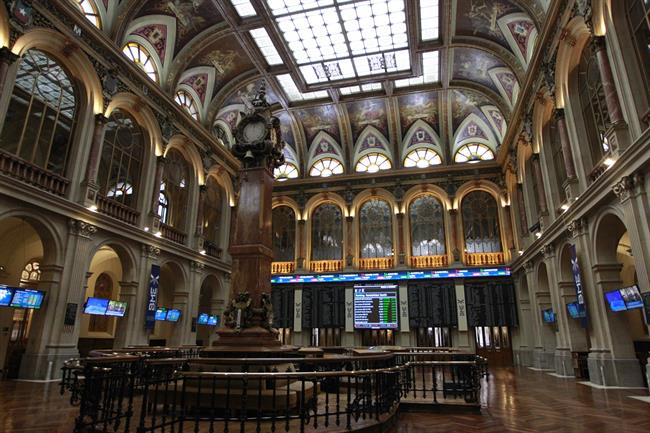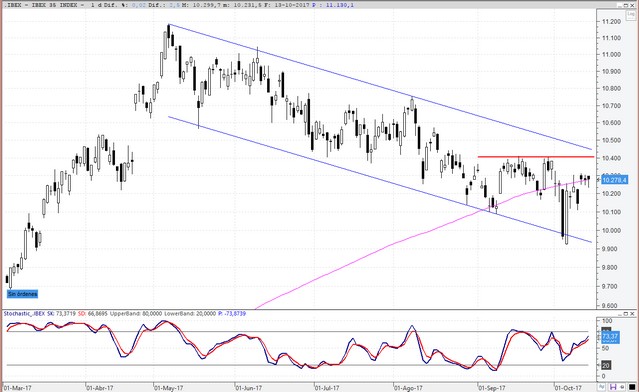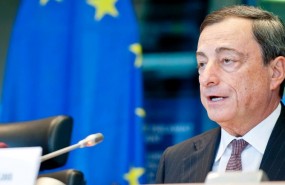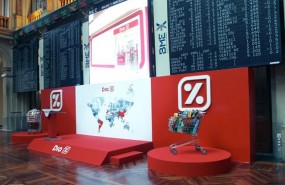- ArcelorMittal was the big winner today after good data from China
- Dax hit new record highs above 13,000

Calmness has returned to the markets. At least for now. The Ibex 35 and Spanish bonds are close to levels from before the Catalan independence referendum, despite tension between Moncloa and the regional government still remaining. The index was down 0.17% on Friday to 10,258 points.
- 11.082,500
- -0,65%
The Ibex still has a way to go reach the 10,410 resistance level in the short term. In the debt market, Spanish 10-year bond yields were up 1.63%, with prime risk at 119 points. Over the week the Ibex is up 0.7%. The Dax 30 was also in the news when it hit new record highs.
Political tension has dissipated from the markets this week. In the middle of the exodus of firms from the region, some companies have clawed back their positions that were lost. Ratings agency S&P warned that there is a risk of recession for the region if the exodus continues.
Outside the region, DIA has dropped 9% this week. The supermarket chain fell 0.16% on Friday to 4.37 euros.
The best performer on Friday was ArcelorMittal, which was up 7.21% after Chinese import data showed iron imports hit record levels. Another company related to commodities, Acerinox, was the second best performer with a rise of 1.69%, followed by Tecnicas Reunidas which was up 1.51%.
On the negative side, Mapfre (-0.8%), Merlin Properties (-0.8%), Santander (-0.7%), Colonial (-0.6%), Inditex (-0.5%) and CaixaBank (-0.4%) were all at the bottom end. In the general stock exchange, Inypsa (-6%) and GAM (-5%) and Pharma MAr (-4%) led the losses.
In Asia, the markets closed the weeks mixed. Nikkei was up 0.96% and hit 21,155 points, increasing the gains to a 21-year high. Chinese commercial balance was released, showing sales outside of China increasing 9% in September in comparison with the year before.
CENTRAL BANKS
Mario Draghi spoke yesterday, in which he said that the organisation would maintain rates at 0% in the long term after the withdrawal of stimulus, which is not clear when yet. The message was against that of Bundesbank chief Jens Weidmann, who said last week that ultra-low rates should not last much longer. The ECB persists, in an attempt to drive inflation to around 2%. On Friday, the statistics office Destatis confirmed that the CPI was at 1.8% in September.
The euro/dollar was mostly flat, despite the inflation data in Germany and that Bloomberg published that the members of the ECB would mull cutting half of its asset buying programme by 60m euros from January. The pound was up, a day after the EU’s chief Brexit negotiator Michel Barnier said there had not been any advance in talks. In commodities, oil was up around 1% at $57.
TECHNICAL ANALYSIS
“Technically everything remains the same, without significant movements that have implications in the graphs. It will continue as such as the Ibex still is unable to reach with clarity above 10,410 points, September highs. Only above this resistance would we leave the door open for a new high,” said Bolsmanía technical analyst José María Rodríguez.
“Meanwhile, European markets are now at little more than 1% from annual highs (with the exception of the Dax), our Ibex is now at 8% from those levels. The problem for the moment is that it is registering 10,000 points like 10,350, and will continue to do so unless it is able to break out.”

Noticias relacionadas

Los productos 'Made in Cataluña' temen la radicalización del boicot de los consumidores

S&P alerta de "una recesión" en Cataluña si no se reduce la tensión política

Draghi incide en que mantendrá los tipos en niveles actuales "durante un largo periodo de tiempo"


